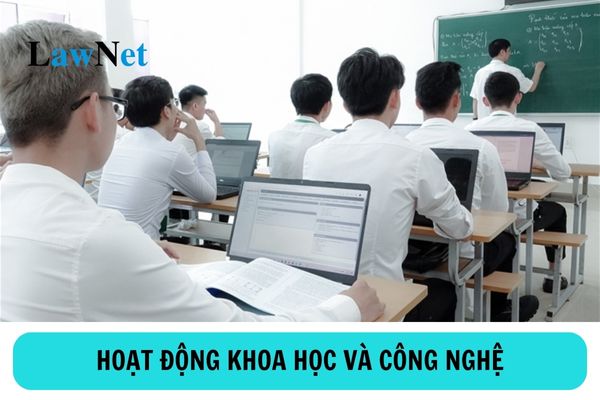What are the objectives of scientific and technological activities in higher education in Vietnam?
What are the objectives of scientific and technological activities in higher education in Vietnam?
According to Article 39 Law on Higher Education 2012, scientific and technological activities in higher education aim to:
- Enhance the quality of higher education, research capabilities, and the ability to apply science and technology among lecturers, researchers, managers, and public employees.
- Develop scientific research capabilities for learners; discover and nurture talents to meet the requirements for training high-level human resources.
- Create new knowledge, technologies, and solutions for the development of science and education, contributing to socio-economic development, ensuring the national defense and security of the country.

What are the objectives of scientific and technological activities in higher education in Vietnam? (Image from the Internet)
What are the duties and powers of higher education institutions in Vietnam in scientific and technological activities?
According to Article 41 Law on Higher Education 2012 (replaced by Clause 1 Article 2 Law Amending and Supplementing a Number of Articles of the Law on Higher Education 2018), the duties and powers of higher education institutions in Vietnam in scientific and technological activities are as follows:
- Develop and implement strategies and plans for scientific and technological development.
- Conduct scientific and technological research to serve and enhance training quality.
- Conduct scientific research and transfer technology to create new knowledge, technologies, and solutions, contributing to socio-economic development according to the institution's scientific and technological capabilities.
- Autonomously and responsibly sign scientific and technological contracts, perform scientific and technological tasks, and register for participation in the selection of scientific and technological tasks.
- Use financial resources, assets, intellectual property values, and legal revenues to fulfill scientific, technological, and production-business tasks.
- Establish research and development organizations, scientific and technological service organizations, and scientific and technological enterprises.
- Be protected in intellectual property rights; transfer, assign scientific and technological activity results; publish scientific and technological activity results.
- Protect the interests of the State and society; legal rights and interests of organizations and individuals conducting scientific and technological activities; safeguard scientific and technological secrets according to the law.
- Execute other tasks and powers as prescribed by law.
What are the contents of scientific and technological activities in higher education in Vietnam?
Based on Article 40 Law on Higher Education 2012, the contents of scientific and technological activities in higher education include:
- Conduct fundamental scientific research, social sciences, humanities, education sciences, and technology sciences to create new knowledge and products.
- Apply research results and transfer technology to practical production and daily life.
- Develop laboratories, research facilities for training and scientific research, technology incubators, and link technology development with creating new products.
- Participate in selection, consulting, critical review, performance of scientific and technological tasks, and contracts as per orders.
What policies does the State of Vietnam have to promote science and technology in higher education institutions?
Based on Article 12 Law on Higher Education 2012 (amended by Clause 7 Article 1 Law Amending and Supplementing a Number of Articles of the Law on Higher Education 2018):
State Policies on the Development of Higher Education
1. Develop higher education to train high-level human resources to meet the needs for socio-economic development and ensure national defense and security.
2. Allocate budget and resources for higher education based on principles of competition, equality, and efficiency through investment spending, research and development spending, research and training orders, scholarships, student loans, and other forms.
Prioritize and grant preferential policies regarding land, tax, credit, and other policies for higher education development.
3. Prioritize investment in developing a number of regional, international-level higher education institutions, training fields, and high-quality teacher training institutions; develop special fields, higher education institutions with sufficient capacity to undertake national strategic tasks and regional development tasks.
Encourage the rearrangement and merger of universities into large universities; implement technology applications in higher education.
4. Implement private investment in higher education, encourage the development of private higher education institutions; prioritize private higher education institutions operating non-profit; offer preferential policies to organizations, enterprises, and individuals investing in education, training, science, and technology activities at higher education institutions; provide tax exemptions or reductions for donated assets, support for higher education, scholarships, and participation in student loan programs.
5. Implement synchronized policies to ensure the autonomy of higher education institutions is linked with accountability.
6. Link training with market labor demand, apply research and technology; promote cooperation between higher education institutions and enterprises, scientific and technological organizations; offer tax incentives for scientific and technological products of higher education institutions; encourage agencies, organizations, and enterprises to accept, facilitate learners and lecturers in practicing, internships, scientific research, and technology transfer, contributing to improving training quality.
7. Attract, utilize, and appropriately honor to enhance the quality of lecturers; focus on developing a team of lecturers with doctorates and leading professors in higher education institutions.
8. Prioritize those enjoying social policies, ethnic minorities, people from regions with particularly difficult socio-economic conditions, learner special fields meeting human resource needs for economic-social development; ensure gender equality in higher education.
9. Encourage and promote international cooperation and integration to develop Vietnamese higher education to regional and world standards.
Thus, the State has the following policies to promote science and technology:
[1] Preferential policies for organizations, enterprises, and individuals investing in education, training, science, and technology activities at higher education institutions;
[2] Link training with market labor demand, apply research and technology.
[3] Scientific and technological organizations; preferential tax policies for scientific and technological products of higher education institutions.

